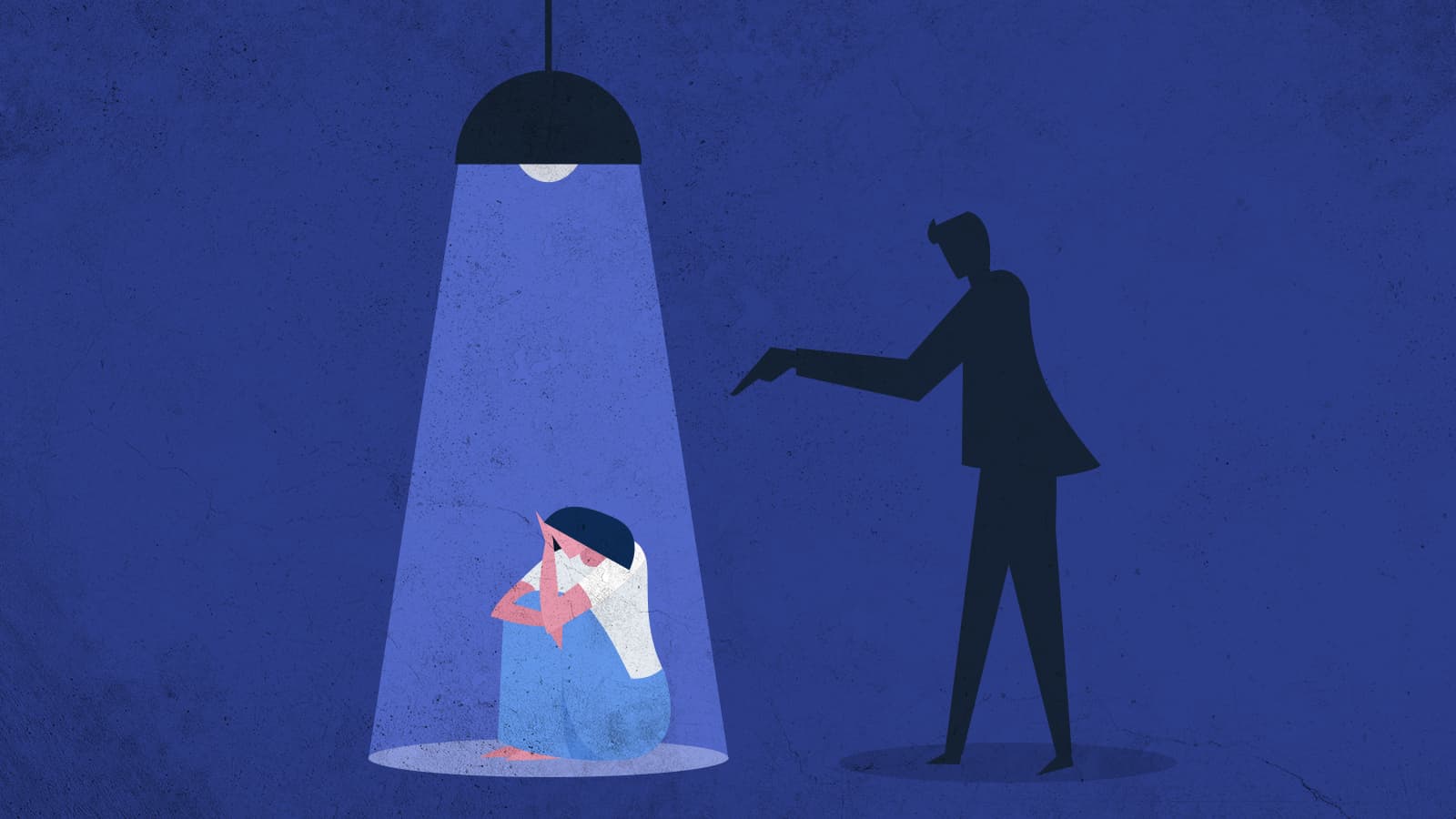Narcissistic personality disorder is a complex cluster B disorder with many complex symptoms. These symptoms affect how a narcissist interacts with the people around them. Often, narcissists feel the need to cast the people closest to them in specific roles that fulfill selfish needs. One of these roles is the scapegoat.
A scapegoat in the context of NPD is someone who they can point to as the bearer of responsibility for a narcissist’s behavior. They’re an easy person to blame and point fingers at, which gives the narcissist a way to justify this behavior. The scapegoat, meanwhile, is entirely innocent of these charges.
The most common scapegoat dynamic occurs in a family with children, according to studies. In this situation, one child is singled out as the “scapegoat” to bear the brunt of all the family’s problems. The scapegoat can also be any other vulnerable member of the family. Whoever it is, they end up in a situation where they lose trust in others, lose self-esteem, and experience toxic shame.
However, a scapegoat can be anyone, not just a family member. Narcissists can find a target virtually anywhere and everywhere and will do their best to identify potential victims for the role when needed. But why do they do this? Are you at risk? Psychology explains why narcissists need to blame others and what type of people they abuse.
1. Narcissists Use Scapegoats As Regulation Through Projection
Research reveals links between general narcissism as a trait, low self-esteem, and even self-loathing. That’s why narcissists often act the way they do because they are deeply unhappy with themselves. They have a lot of negative emotions that they try to suppress because they don’t know how to regulate them.
To find a way to deal with these emotions, narcissists use scapegoats. They’re not able to develop proper self-awareness, nor are they able to self-reflect. They also can’t benefit from therapy or healthy relationships because it’s hard for them to build that positivity without professional help.
It’s common knowledge that repressing emotions makes them stronger. Numerous studies confirm this. Without regulation, a narcissist’s feelings keep growing stronger and stronger. The fact that many of those emotions are about their own self-loathing only makes matters worse.
A Narcissist’s Need For Manipulation
Like anything bottled up, those negative emotions need an outlet. A narcissist uses a scapegoat as that outlet. They project their feelings onto that person and paint the scapegoat with the qualities that they dislike about themselves. Then, they yell at, berate, and abuse the scapegoat as they secretly think of themselves. Here are some examples of this projection.
A narcissist who worries about their appearance will constantly attack a scapegoat for how they look. This abuse may include ridiculing their fashion sense, questioning their eating or exercise habits, or belittling physical features.
A narcissist knows their manipulative tendencies and feels shame. Thus, they assume that their scapegoat is always out to get them. They will project their way of thinking and twisted toxicity onto that scapegoat. A narcissist casts themself as a victim and their scapegoat as the mastermind. However, the truth is the opposite.
A narcissist who feels they cannot reach their full potential will attack a scapegoat over their achievements. They might discourage the scapegoat by saying they’re incapable, lack skill, or are too “lazy” to succeed. Or they may downplay the scapegoat’s success by acting like it’s not a significant achievement or telling the scapegoat they don’t deserve to be proud. They could also demand more from the scapegoat by telling them they’re not doing enough to succeed.
Narcissists spend a lot of their lives creating a false version of themselves that they can hide their insecurities behind. Their real selves are what they then project onto others, complete with those vulnerabilities. Without a scapegoat, they have no outlet and would experience breakdowns and self-implosions.
2. Narcissists Use Scapegoats To Avoid Detection
The most common reason for scapegoating – whether from narcissists or other people – is to transfer blame and responsibility. Narcissists care deeply about their image. They spend a long time carefully curating how they want to showcase themselves to the world. This usually involves hiding their narcissistic traits and behaving like a perfect, unblemished being.
People often think of narcissists as supreme evil villains who pull all the strings behind closed doors, but that’s far from true. They’re human beings who are prone to mistakes. When people get suspicious, they need someone to point their fingers at – and that’s why a scapegoat is essential to them.
This need is central to two other key characteristics of a narcissist’s lies: denial and rationalization. These are both defense mechanisms, both for the narcissist’s mental state and their covertness to others.
A narcissist may utilize denial with a scapegoat by:
- Gaslighting the scapegoat into accepting a false version of reality where the scapegoat is entirely to blame for the narcissist’s behavior
- Denying the emotions and thoughts of the scapegoat and constantly invalidating their views and opinions
- Distracting people from reality and the truth by directing their attention to the scapegoat
- Remain in denial about their own emotions, thus continuing projection onto their scapegoat
Similarly, a narcissist may utilize rationalization with a scapegoat by:
- Justifying their behavior to both the scapegoat and the people around them
- Normalizing their behavior in the eyes of the scapegoat, acting as if the victim is the weird one for having a problem with the narcissist’s behavior
- Blaming the scapegoat for anything and everything that goes wrong
- Telling a scapegoat that no one believes them or everyone thinks they’re crazy
- Making their scapegoat codependent on them
- Giving their scapegoat the silent treatment to make them question their actions and emotions
Narcissists employ many other tactics to keep their scapegoats in line. They need their scapegoat to believe their lies to be convincing. This abuse is why scapegoats often wind up with long-lasting trauma from the narcissism they endured.
What Type Of People Do Narcissists Look For As Scapegoats?
Not every person is a good candidate for scapegoating. The wrong person would not fuel the narcissist in the way they need. Perhaps they won’t engage with the narcissist’s goading, or they might cut the narcissist off. Or maybe they’re in too good a standing with those around them, so they’re unlikely to be blamed for the narcissist’s issues.
This is why narcissists often pick suitable targets for their behaviors. They need scapegoats with specific qualities that are susceptible to manipulation and malleable to a narcissist’s will. Here are the kinds of people they seek out:
· Those With Low Self-Esteem
It’s easy to break down a person who is broken and vulnerable. Narcissists pick people who can be manipulated and coaxed into codependency because of their low self-esteem. They’ll feed these scapegoats just enough validation to keep them hooked while criticizing them enough to make them want to please. It’s almost like negging. Those with low self-esteem also make the perfect spaces for projection.
· Caretakers
Caretakers are individuals who are naturally nurturing and tend to be forgiving. As their description suggests, they desire to care for those around them, making them quite empathetic. This makes them an easy target – pulling on their heartstrings is easy. Narcissists use caretakers by pretending to be hurt by them, playing the victim until the caretaker looks after them and takes responsibility for the narcissist’s behavior.
· Rebels
When someone is already going against norms and getting in trouble, they’re a convenient target for scapegoating. This is especially true if the narcissist already manages to build a decent reputation. A troublemaker being to blame for someone’s problems is an easy idea to swallow. A narcissist will also likely lovebomb a rebel to get them attached, making the rebel feel like they’re important and giving them a much-desired bond of faked understanding. Once the rebel is trapped, the narcissist can turn them into an easy figure to blame.
· Problem-Solvers
Problem-solvers are always looking to find solutions and fix situations. As caretakers, they may take responsibility for other people’s actions, working to correct any wrongs they have committed. The problem-solver can be a good scapegoat for narcissists because they’ll take it upon themselves to patch up problems. The narcissist has to point out all the issues, connect the problem-solver to them, and put them to work.
· Those They Want To Be Like
If there’s someone a narcissist is envious of, they’ll likely try to turn that person into a scapegoat. For the sake of the green-eyed monster, a narcissist will project, hard, onto the subject of their envy to try and find things that are wrong with them. Being able to tarnish the reputation of someone the narcissist wishes they could be like is just the cherry on top for them.
Final Thoughts On Understanding Why A Narcissist Needs A Scapegoat
Narcissists need victims to handle their emotions and regulate their self-loathing. They also need scapegoats to form their perfect image and have someone to blame all problems on, creating the ideal defense. They convince their scapegoat that the scapegoat is always at fault in the process, leaving lifelong trauma on that victim.
Narcissists typically seek out vulnerable or highly empathetic people to use as scapegoats. This is why so many narcissists have a chosen child as a scapegoat. However, a narcissist will likely also find other scapegoats for the different social circles that they spend time in.
It is worth pointing out that the word “narcissist” has been carelessly thrown around more often in recent years. The term does not apply to anyone; people can be toxic, manipulative, or unpleasant without being narcissists. Identifying a real narcissist is vital for your mental health and safety. Incorrectly labeling them will only cause more trouble.
If you think a narcissist currently scapegoats you, you must disengage and get away as soon as possible. Being the victim of a narcissist can harm your self-esteem, and you may have already fallen under the spiral of their spell. Seek professional help if you need it!





















